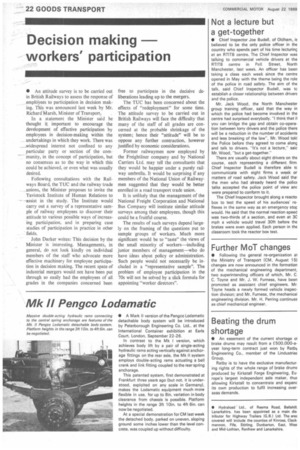Decision making workers' participation
Page 24

If you've noticed an error in this article please click here to report it so we can fix it.
• An attitude survey is to be carried out in British Railways to assess the response of
• empiciYees to participation in decision making. This was announced last week by Mr. Richard Marsh, Minister of Transport. In a statement the Minister said he thought it important to encourage the development of effective participation by employees in decision-making within the _ undertakings in which they work. There was __widespread interest not confined to any particular party or section of the corn __ munity, in the concept of participation, but no consensus as to the way in which this could be achieved, or even what was usually desired.
Following consultations with the Railways Board, the TUC and the railway trade
• _unions, the Minister proposes to invite the Tavistock Institute of Human Relations to – –assist in the study. The Institute would carry out a survey of a representative sample of railway employees to discover their attitude to various possible ways of increasing participation, and in preparing case studies of participation in practice in other fields.
John Darker writes: This decision by the Minister is interesting. Managements, in general, do not look kindly on individual members of the staff who advocate more effective machinery for employee participation in decision making. The recent spate of industrial mergers would not have been put through so easily had the employees of all grades in the companies concerned been free to participate in the decisive deliberations leading up to the mergers.
The TUC has been concerned about the effects of "redeployment" for some time. The attitude survey to be carried out in British Railways will face the difficulty that many of the staff of all grades are concerned at the probable shrinkage of the system; hence their "attitude" will be to oppose any further contraction, however justified by economic considerations.
Former railwaymen now employed by the Freightliner company and by National Carriers Ltd. may tell the consultants that they would be happier under a purely railway umbrella. It would be surprising if any members of the National Union of Railwaymen suggested that they would be better enrolled in a road transport trade union.
It is unlikely that the management of the National Freight Corporation and National Bus Company will institute similar attitude surveys among their employees, though this could be a fruitful course.
The results of such surveys depend largely on the framing of the questions put to sample groups of workers. Much more significant would be to "taste" the views of the small minority of workers—including junior members of management—who do have ideas about policy or administration. Such people would not necessarily be included in a "representative sample". The problem of employee participation in the 70s will not be solved by a slick formula for appointing "worker directors".
















































































































